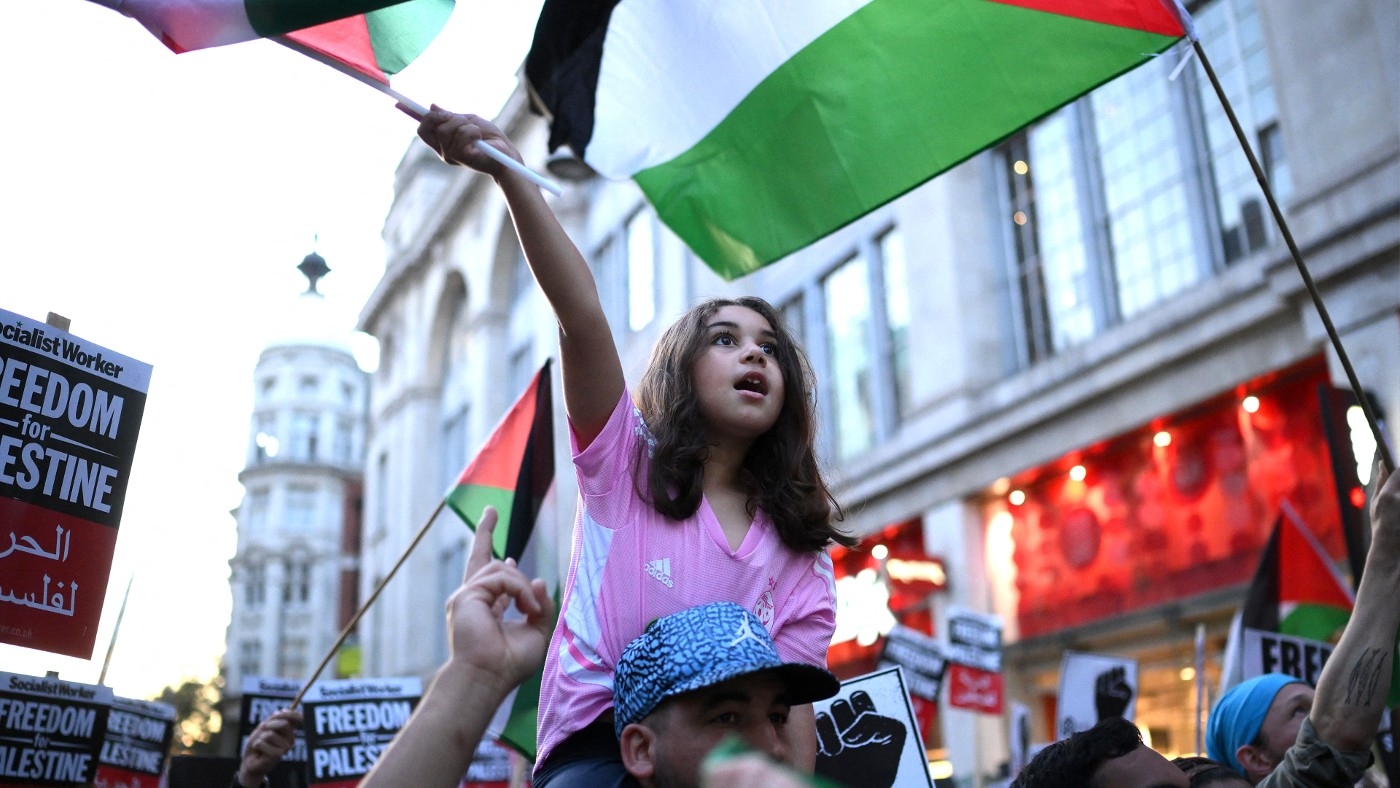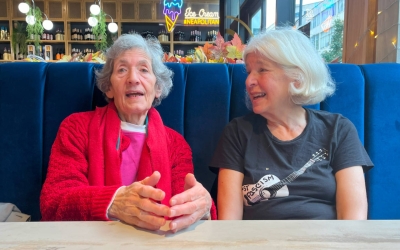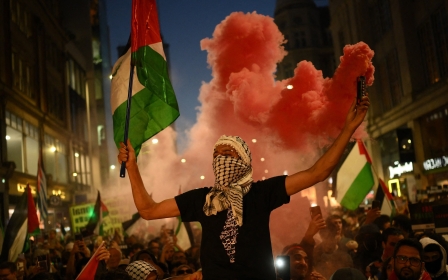Israel-Palestine war: How UK became a hostile environment for Palestinian activism

When Israel launched its bombardment of Gaza following Saturday's attack by Palestinian fighters into southern Israel, Azfar Malik received a phone call from teachers.
Picking up the call, Malik's friends asked if he would be re-launching a service he set up temporarily in 2021 to help students and teachers reprimanded for voicing support for Palestinians during a previous round of Israeli bombing of the besieged enclave.
"We hesitated at first, but given the climate around Palestine activism, we felt there was no choice," said Malik, a pro-Palestinian activist who wished to use a pseudonym to protect his identity.
When Malik last operated the service, Middle East Eye reported on a series of incidents that saw British schoolchildren reprimanded for supporting the Palestinian cause, with many threatened with punishments ranging from detentions to expulsion or being blocked from taking exams if they continued protesting for Palestinian rights on school premises.
Malik told MEE he had handled at least 40 cases from across the UK that involved students facing punishment for displaying Palestine flags on their hands and or masks, or for wearing keffiyehs, with one school describing the Palestine flag as a "call to arms and symbol of antisemitism".
But since then, many activists and rights groups have told MEE that the UK has become an even more hostile environment for Palestine activism and those fundraising for the Palestine cause.
On university campuses, students organising around Palestine have faced growing restrictions as a consequence of the Prevent strategy.
These concerns have been compounded further by proposed legislation currently passing through parliament that would ban public bodies from boycotting or voicing support for a boycott of Israel and other countries - the so-called anti-boycott bill which the government has said is primarily aimed at curbing support for the Boycott, Divestment and Sanctions (BDS) movement.
Alice Garcia, the advocacy and communication manager at the European Legal Support Centre (ELSC), which provides legal support for pro-Palestine activists, said most of the cases covered by the ELSC in Europe have come from the UK.
Since last Saturday, Garcia said the ELSC had been "overwhelmed by requests for help" from people who support the Palestine cause.
"The UK is a particularly harsh context, and it is where ELSC is most active, with Germany, in terms of monitoring incidents of anti-Palestinian racism but also in terms of [providing] legal support," said Garcia.
Follow Middle East Eye's live coverage for the latest on the Israel-Palestine war
"As an organisation monitoring incidents of repression of Palestinian rights advocacy in the UK (and the rest of Europe), we can say that the number of incidents reported to us and requests for legal support have been increasing.
"This has been facilitated by anti-Palestinian policies conflating Palestine advocacy with antisemitism – such as the institutionalised IHRA definition of antisemitism – or attempts from the government to crack down on social justice activism, the latest example being an anti-boycott bill. Some institutions, such as schools and universities, have also failed in their obligations to uphold freedom of expression and academic freedom."
Last month, the British Society for Middle Eastern Studies (BRISMES), an influential academic association, called on UK universities to drop the International Holocaust Remembrance Alliance's (IHRA) controversial definition of antisemitism due to concerns it had been used to target students and staff critical of Israel.
Critics of the definition say it conflates criticism of Israel with antisemitism. But despite these concerns, many UK universities adopted the definition after the UK government threatened to cut funding to universities if they did not do so.
Palestinian activism has also come under scrutiny on campuses because of the Prevent counter-terrorism strategy. In 2017, MEE revealed that university staff were being advised to "risk-assess and manage" Palestinian activism as part of Prevent training.
Palestinian student Saleem Nusseibeh believes the Palestine cause is often the "testing ground" for some of Britain's most draconian pieces of legislation.
"From the counter-terrorism bill in 2005 that introduced the Prevent strategy used to silence Palestine activism, to what we're seeing now with the IHRA definition and the further difficulties we face as Palestinian student activists, it takes great resolve and determination to be a Palestine activist in a university space," Nusseibeh told MEE.
"Things like booking rooms, making sure our speakers are approved. We had to deal with these things consistently."
Proscription of Hamas
In November 2021, the UK government placed Hamas, which has controlled Gaza since 2007, on its list of proscribed terrorist organisations. Previously only Hamas's military wing, the al-Qassam Brigades, had been proscribed.
Earlier this year, British aid charities told MEE it was becoming harder to operate in Gaza after organisations working in the occupied Palestinian territories were ordered to provide details of their operations, including all financial transactions, to the UK's sanctions regulator.
Even the opposition Labour Party, whose former leader Jeremy Corbyn has been a staunch advocate for Palestinian rights, is no longer considered a safe space by pro-Palestinian activists.
Many of them reacted with anger and dismay this week when leading figures in the party, including leader Keir Starmer, declared their support for Israel, with Starmer expressing the view that Israel had the right to cut off supplies of water and electricity to Gaza.
Late on Thursday, Lubaba Khalid, a Palestinian Labour member, resigned from her post as the Black, Asian and Minority Ethnic officer of Young Labour - the party's youth wing.
Describing Labour as "no longer safe for Palestinians and Muslims," Khalid said she had resigned because of Starmer's comments and similar remarks by Emily Thornberry, the shadow attorney general.
Last week, MEE reported that Labour had banned the UK's largest pro-Palestine group, the Palestine Solidarity Campaign, from using the word "apartheid" to describe its event at this week's party conference in Liverpool.
Others once inside Labour have been forced out of the party. Rica Bird, a 77-year-old Jewish activist from Merseyside, told MEE she had been expelled because of her membership of a banned left-wing group supportive of Corbyn.
The founder more than 20 years ago of Merseyside Jews for Peace and Justice, Bird said she had previously been accused of antisemitism by party officials over her advocacy for Palestine.
"There are threats to our own freedom here, in terms of the right to protest," said Bird.
"It's not the kind of United Kingdom I grew up in. We have to take to the streets to demand our fundamental human rights. There is a rich history of resistance to oppression here," Bird said, referring to radical movements from British history including the 17th-century Diggers and the Peasants' Revolt of 1381.
Palestinian flags under scrutiny
On Monday evening, thousands of people attended a raucous pro-Palestine demonstration on the road outside the Israeli embassy in London. Many waved Palestinian flags and sang chants in support of Palestine.
On Tuesday, Suella Braverman, the home secretary, wrote to police chiefs to remind them that displays of support for Hamas were illegal and urged them to also consider whether displaying Palestinian flags or pro-Palestine chants could be public order offences.
In response, the London Muslim Community Forum, which liaises between police and Muslim communities in the capital, said it had received reassurances from police chiefs that Palestinian flags could be displayed at protests, and said it would take legal action against any decision to block freedom of speech or freedom of assembly.
Despite these challenges, activists say they remain undeterred and hopeful.
Protests are planned across the UK this weekend amid growing fears that an Israeli ground assault against Gaza is imminent, and Garcia said she believes those who choose to participate will be "on the right side of history".
"Large coalitions have been formed to push back against the government's anti-democratic measures and the solidarity movement remains undeterred," she said.
Additional reporting by Oscar Rickett.
Middle East Eye propose une couverture et une analyse indépendantes et incomparables du Moyen-Orient, de l’Afrique du Nord et d’autres régions du monde. Pour en savoir plus sur la reprise de ce contenu et les frais qui s’appliquent, veuillez remplir ce formulaire [en anglais]. Pour en savoir plus sur MEE, cliquez ici [en anglais].






